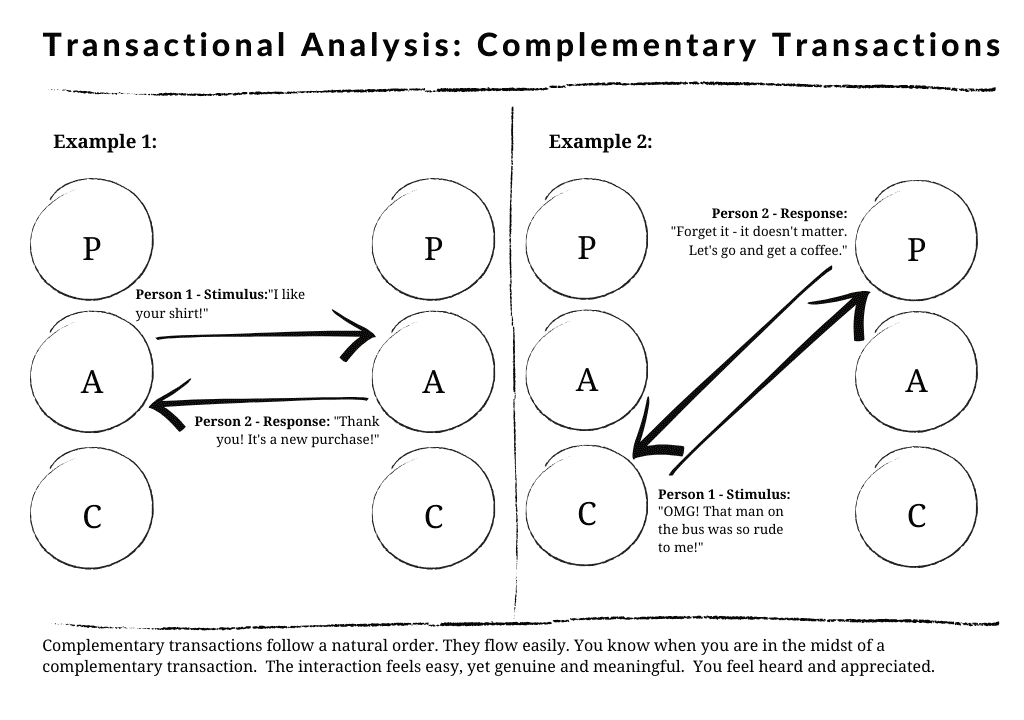How To Be An Adult About It?
There is a fascinating modality called "transactional analysis." The core idea is that we shift between three major ego states: child, parent, and adult. These states show how we engage with the world and how we engage with others. Often, someone being in one state (e.g., a child) triggers the opposite state (e.g., an adult).
Child: "Acting like a child" This state can be curious, open, creative, intuitive, but can also be rebellious or victimy and hopeless. When we’re in a child state, we’re often giving away our power. We feel like life is happening to us. People often step into a child-like state when they perceive themselves as powerless or want to get a nurturing response from another person. It's easy to notice in couple dynamics. When one person speaks with a high-pitched voice and big childlike eyes,
Parent: "Don’t condescend to me" In many ways, the opposite of the child ego state. It’s nurturing and protecting, but also condescending, strict, or falling into overprotecting or rescuing. The problem is that whenever the parent gets the upper hand, the other person gives away their power. Being in the parent (rescuer or judge) state can trigger the child (victim) in the other person.
Adult: "Being an adult about it" It’s an aware and responsible state. In transactional analysis, it’s often considered an ideal state where the person faces reality. It doesn’t negate any experience. In fact, it integrates everything as useful data. It’s a resourceful state where making change becomes possible. Adults interact with the world in a responsible way. When two adults speak, they can disagree respectfully.
It’s an incredibly deep subject. Some people learn its nuances through a lifetime of practice. This will be a gross oversimplification. But hopefully, you’ll get the core idea. It’s exciting as I will be talking about the nature of transformation.
If you know Transactional Analysis (TA), you’ll definitely find this interesting. If you haven’t heard about it, by all means, look it up.
HOW TO BE AN ADULT ABOUT IT?
===
QUESTION:
"How to help my client reach the adult ego state?"
This is a question a coach asked. Because it’s a really good question and the answer goes deep into what transformational work means, I'm sharing it as I answered it to her.
The adult ego state is non-reactive, compassionate, and responsible.
Whenever we're triggered in our drama, we move into other ego states, like child or parent. This state is broadly considered an ideal state, but the other states are not wrong either. Some schools even encourage clients to explore and work in those states. The adult state is really potent because, through awareness and responsibility, the client can make a change in their life. It's a transformative place if you like.
Your client can move back to an adult state not by trying to fix their experience but by holding them with reverence.
When they do that, they move into a state of higher awareness and responsibility. This is an ideal, humanistic environment where transformation automatically happens. And it happens without you (the coach) or the client trying to fix things.
Let me explain.
Hold the problem with reverence!
This is where you can help. You can help them to see and hold their situation with reverence without trying to fix it.
When we want to fix our problems, we're in a "triggered" or "running away" state. We enter a child or parent's state depending on the coping mechanisms we developed throughout our lives.
Consider that every problem/trigger originally had a good intention behind it. They are coping mechanisms that we developed to try to protect ourselves in some ways. They might have even been useful at some point.
For example,
A child is helpless for a reason. She needs nurturing, and she needs to learn. Helplessness allows the child to be in a receptive state. An adult, on the other hand, is protective or authoritative for another reason. She needs to take care of her baby.
But as we develop in life, these originally useful states start to show up as coping mechanisms. Fixes for problems. At this stage, in a weird way, these fixes are like band-aids, perpetuating the problem. We're stuck coping rather than solving.
Acknowledging this good intention and its present impact on the client's life can already be quite transformative for them.
This acknowledgement makes it easier to practise compassion. And there will be no need to run away from it anymore. She/he can see the triggers mindfully for the first time in their life. And they can take responsibility.
It's not about removing the triggers but changing the client's relationship to the triggers.
“I don’t fix problems. I fix my thinking. Then problems fix themselves”
YOUR CALLING AS A COACH
===
Again...hold it with reverence and just by helping your client to look at their experience with full reverence, they will gain insights. Their relationship to the problem will shift, which will bring about transformation. They will feel differently about it and they will create new thoughts about it. This is the transformative approach.
Finally,
It's hard for us coaches to hold our client's problems without trying to fix them because we want to be valuable as coaches. This is especially true when we haven't been able to hold our own problems with reverence. That's why doing our own work is so important.
I hope it helps. Lots of love!
From the bottom of my heart,
Viktor Sághy

